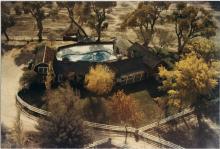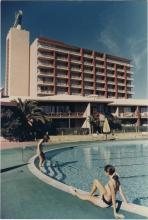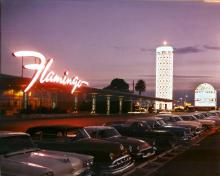Collection Paragraphs
In Las Vegas
"I like to think of Las Vegas in terms of well-dressed man in a dinner jacket, and a furred female getting out of an expensive car. I think that is what the people expect here -- to rub shoulders with V.I.P.'s and stars. Possibly dressed in sports clothes, but if so, at least in good sports clothes. I don't think we should permit this place to degrade into a freak or amusement park category, like Coney Island.
Bob, there are almost ten new hotels announced. The one that troubles me the most is the new Holiday Inn right smack in front of the Sands. To make it much worse, they are planning to make it a Showboat sitting in a huge lake of water. A Showboat with a pond of stagnant infested water. If they are considering using water from Lake Mead, the effluent in the water would smell to high heaven. Jesus! When I think of that lake of sewage disposed on the front lawn of the Sands. Ugh! It may even smell up our Sands Golf Course. Whatever the sources of the water, there would is the additional problem of mosquitoes. They would not be able to have water running in and out, so it would become stagnant and an ideal place to breed mosquitos. If this crumby hotel cannot be stopped, I would just as soon sell at a loss the Sands..."
Memos from Howard Hughes to Robert Maheu, 1967, quoted by Michael Drosnin in Citizen Hughes, pp.107-108

When Howard Hughes slipped into Las Vegas on a special Union Pacific train on the night of November 27, 1966, and took up his bizarre residence on the top floor of the Desert Inn, Hughes had already become an eccentric and increasingly mysterious recluse. Although he continued to play monopoly with his companies and fortune through an army of dedicated agents and aids, his public career as a celebrity -- the great Industrialist-Aviator-Movie Producer -- was over.
Howard Hughes did not build a thing in Las Vegas; in fact he was spooked by the city. His idea of Las Vegas was the movie set for his 1952 production of The Las Vegas Story with Jane Russell, Victor Mature, and Vincent Price. He had used the Flamingo, as Alan Hess recounts, "to represent all that was glamorous and exciting about Las Vegas . . . as the example of grandeur and the luxury of plush gambling on the Las Vegas Strip." That was the Las Vegas that the delusional Howard Hughes returned to in 1966, to hide from subpoenas and the media, and to build an empire in the desert. But by 1966 the glamour world of the Flamingo was a delusion from the past. Hughes was living another reality in 1966 controlled by a cohort of Mormon advisors, communicating with his lieutenants, even the chief of his Nevada Operations, via memo. Hughes was horrified by what he would have glimpsed from his penthouse windows had they not been permanently covered to shield him from the dangerous sunlight and germs. Circus Circus was bringing Coney Island next door, and his nemesis, the federal government, was shaking his penthouse by testing nuclear devices just down the highway. To the paranoid Hughes, Las Vegas had become a place of Fear and Loathing.

Hughes had purchased the Desert Inn, as the story goes, because he couldn't get a room there, and took over the top floor. He then proceeded to purchase the Sands, the Frontier, the Silver Slipper, and that monument to failed dreams, the Landmark, with its space-needle saucer-on-a-stick. Hughes is credited with bringing corporate legitimacy to Las Vegas, and running out the Mafia. The State of Nevada did oblige Hughes by changing its gaming licensing laws for him, thereby ushering into Las Vegas publicly traded hotel corporation like Hilton and Marriott, who changed the face of Las Vegas and whose hotels looked like hotels and corporate towers, not like roadside motels with big signs.
Under Hughes, or Hughes's people, his hotels continued business as usual, and for all intents and purposes under their previous management. Moe Dalitz still ran the Desert Inn, Jack Entratter and Carl Cohen, the Sands. The story was that people like Dalitz and Entratter were tired of Bobby Kennedy's Justice Department's relentless investigations of their business associates and decided to sell out to Hughes. But the economic changes that were affecting Las Vegas hotels and driving the expansion of convention centers and room additions would have occurred without Hughes. How Hughes's people marketed their hotels as tourist, convention and entertainment centers was no different than what other hotels were doing, or from what Hughes properties had been doing before he took them over.
Hughes contribution to the Las Vegas Casino world was the opening of the troubled Landmark property as a casino. Originally built as an apartment building, the Landmark had struggled with financing, purpose, and location. The Hughes properties turned out not to be the spectacular success that some had expected (and hoped) was inevitable of any Hughes enterprise. The Frontier, like the Sands, was already being completely revamped by 1967, dropping its original western theme and joining the new Sands on a renovated Strip. The Silver Slipper remained notable mostly for its YESCO sign, a giant pop art silver slipper. A planned mega-4000 room expansion for the Sands never materialized. It was for Sheldon Adelson to completely re-do the Sands -- in fact by blowing it up -- to make way for the Venetian; the only part he kept was the Sands Expo/Convention Center.

His hotels were not the most profitable part of Hughes's Nevada Operation, and were unloaded after Hughes skipped town in 1970, to die soon after. The fact that the Hughes Corporation owned significant chunks of the Las Vegas valley, to be developed by its Summerlin Corporation subsidiary, was the lasting legacy of Howard Hughes in Las Vegas: master planned communities within a master planned community where even Howard Hughes might have felt safe from the horrors of the Strip and the Test Site.
Hughes fled Las Vegas, haunted perhaps by the Merry-Go-Round of Circus Circus; the Circus Circus, about which Hunter S. Thompson in his drug apocalypse, Fear and Loathing in Las Vegas, said "is what the whole hep world would be doing on Saturday night if the Nazis had won the war." But to Hughes it meant kids. Hughes described this apocalypse in his own words in a memo:
"The aspect of the Circus that has me disturbed is the popcorn, peanuts, and kids side of it… And also the Carnival Freaks and Animal side of it . . . In other words the poor dirty, shoddy side of Circus life. The dirt floor, sawdust and elephants. The part of a circus that is associated with the poor boys in town, the hobo clowns, and, I repeat, the animals. The part of the circus that is synonymous with the common poor -- with the freckled faced kids, the roustabouts driving the stakes with three men and three sledgehammers…"
His presence in Las Vegas needs more explanation than he is willing to give. Since the beginning of this year he has made his home in a series of austere single rooms at the Flamingo Hotel in Las Vegas , flying his private plane to Los Angeles only when his presence there is absolutely essential…
In a resort city that consists essentially of a strip two-and-one-half miles long and a few hundred yards wide, Hughes manages to keep himself almost completely inaccessible. His hotel room telephone is permanently plugged; his private numbers are closely guarded secrets
Hughes: I don't like this on account of the residence deal. There is going to be a hearing next month as to the validity of my Las Vegas residence. We have a whole set up to submit. Just say that the numbers are a closely guarded secret.
Then too it is no secret that he has invested heavily in Las Vegas land, and perhaps plans construction of some major division of Hughes Aircraft. The land is relatively cheap, the climate is perfect for flying and the terrain for airstrips, and power is available from nearby Hoover Dam. Hughes is mum on the subject
Hughes: Strike out "invested heavily" and the rest of the sentence after "land" - I'm not going to do that. This sort of rumor has caused a lot of real estate flurries already and if it is in print the real estate men will make more of it than they have. I don't want that. Can't you say, "purchased some land" instead of "invested," and the rest of it is misleading.
White: I won't quite do that - but I will say it has been rumored he will build a plant.
Hughes: Will you say "purchased" instead of "invested"?
White: I will say "bought"
Hughes: About the construction will upset my employees at the aircraft. If I deny it, then I have to give the reason for it. I think there were rumors a year ago but they are dormant now. If you awaken them, I will make enemies in Las Vegas .
Crisp Bacon
(1) crisp bacon, and milk... (2) v-8 juice... small can
Hughes: Strike out "crisp", I don't like it crisp. And be sure to strike out "milk". That is another thing that has hounded me all my life, like the tennis shoes. I never drink milk - well, I might with apple pie or hot cakes, but I very seldom eat those foods.
White: What do you drink?
Hughes: V-8 juice and water with my meals. (2) I don't like it out of a can that has been opened a long time, so if they use a small can then I am sure it is fresh. However I don't care if they pour it out of a gallon can, if they have just opened the can.
